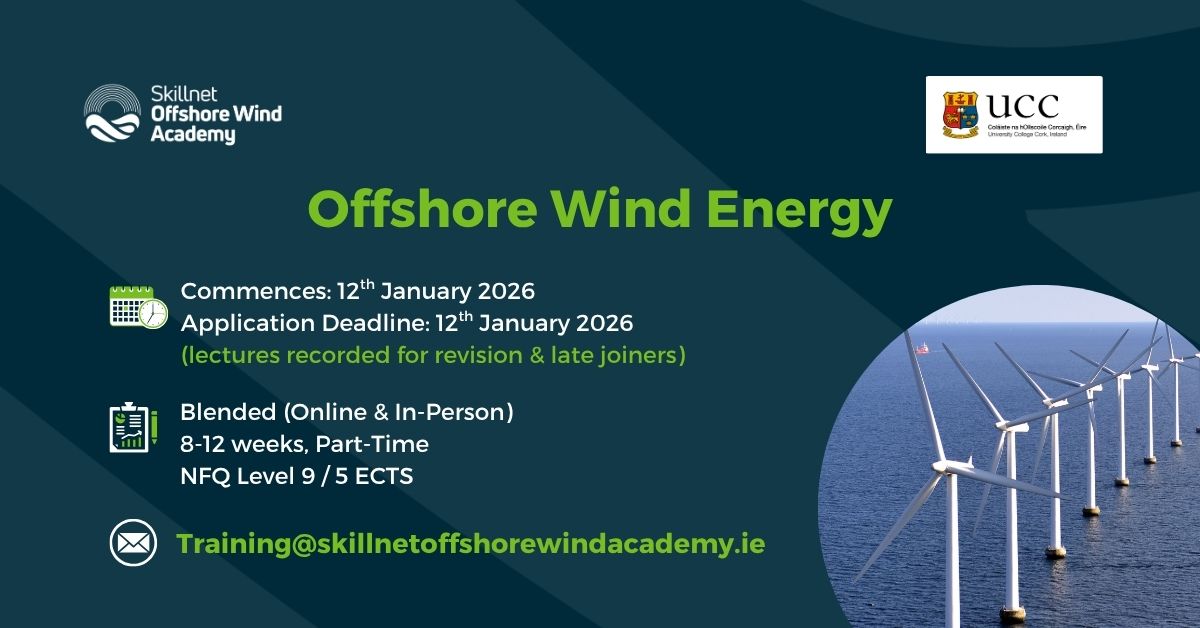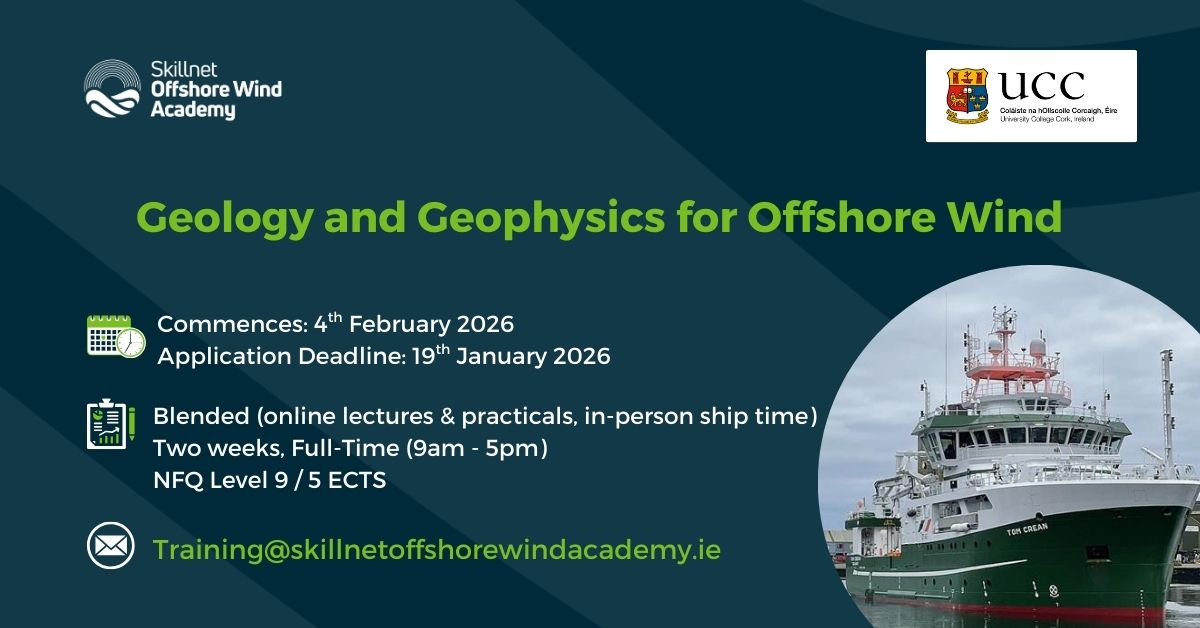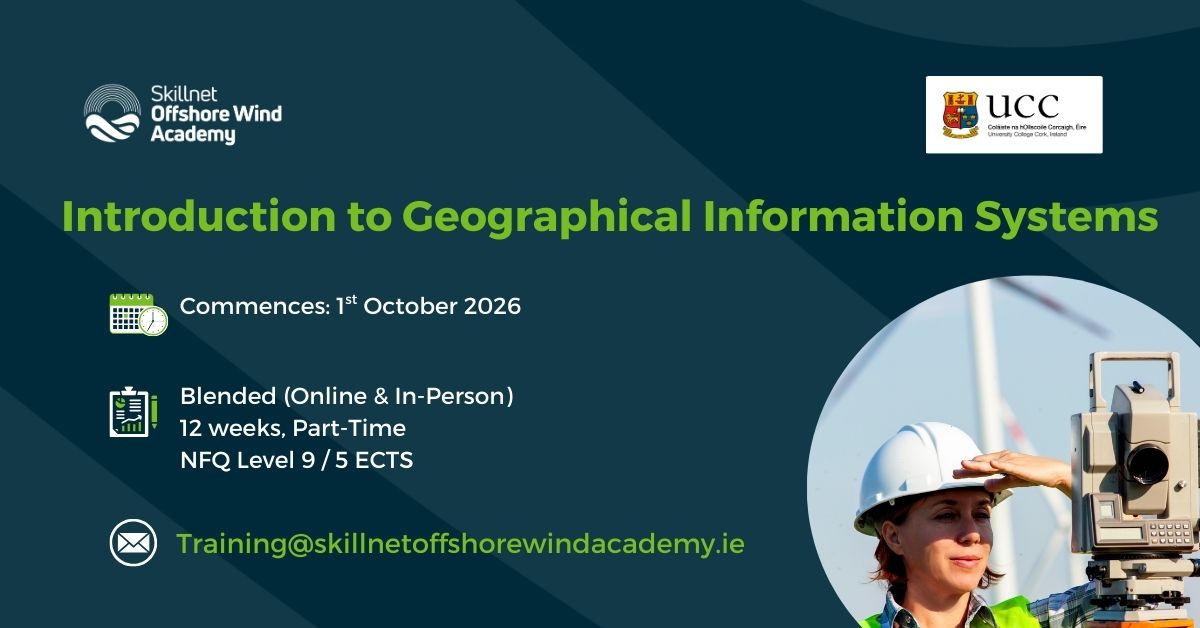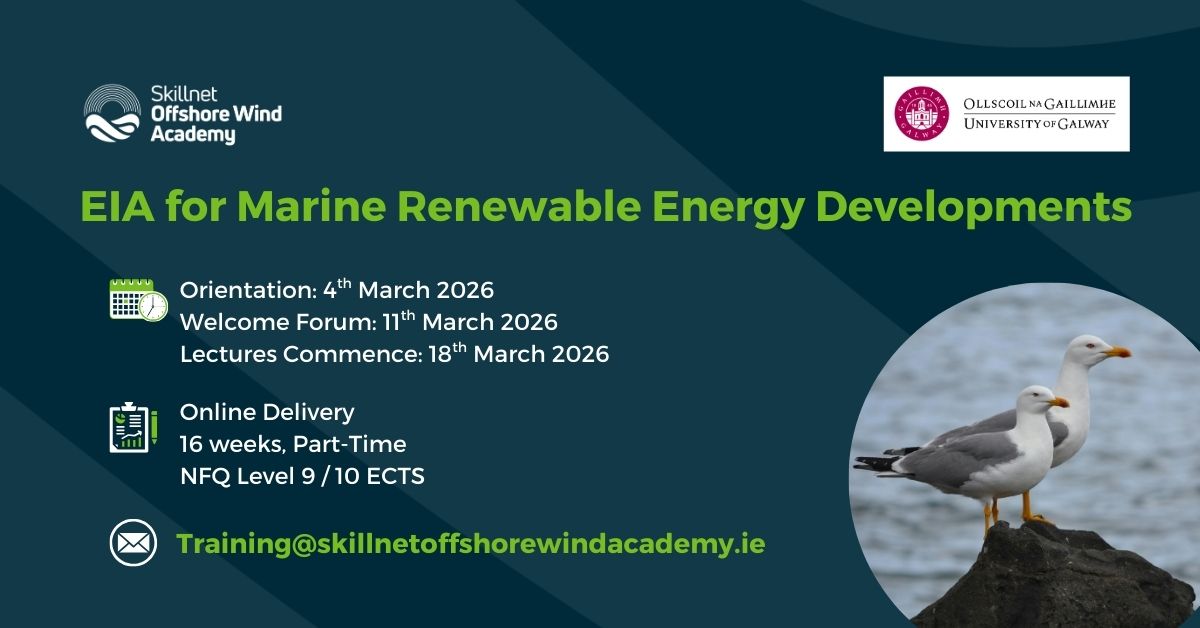
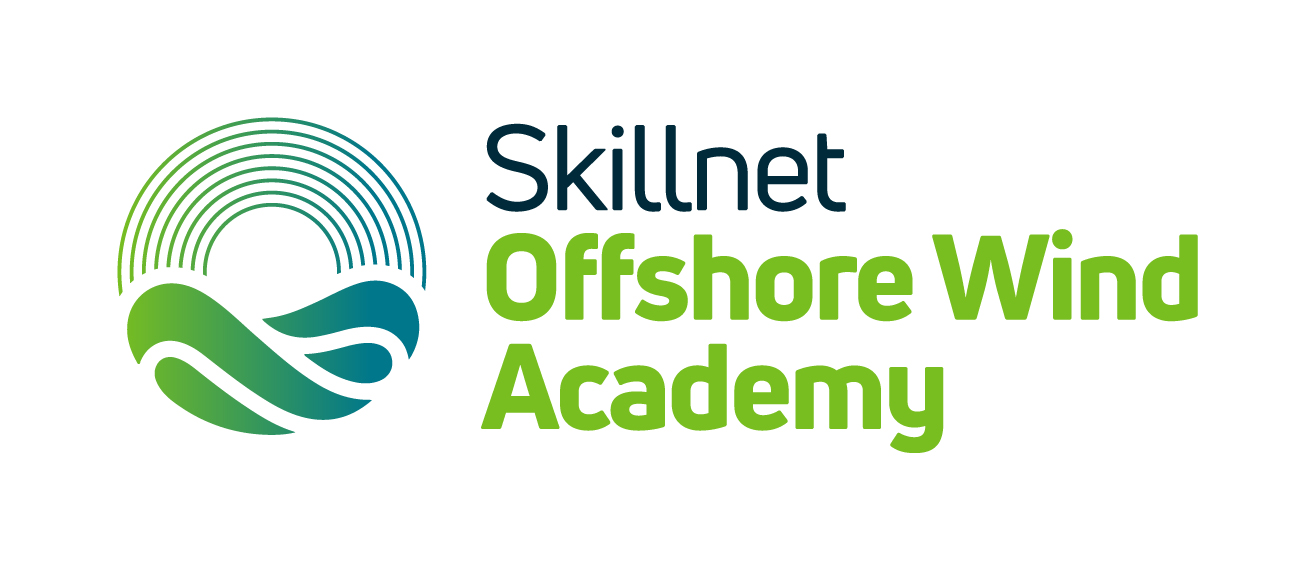
The Offshore Wind Energy micro-credential equips learners with a comprehensive understanding of the engineering, environmental, economic, and regulatory factors that shape offshore wind energy systems. Students will gain an understanding of advanced engineering and non-engineering issues relevant to offshore wind energy systems design, construction, operations, finance, and governance. Covering topics such as energy storage, offshore structures, operations and maintenance, environmental impacts, and marine governance, the module blends weekly lectures with guest industry input, practical assignments, and a site visit to the National Ocean Test Facility in Cork.
This module provides an in-depth exploration of the key technical, environmental, and regulatory aspects of offshore wind energy. Topics include:
- Energy storage solutions for offshore wind integration
- Wind and wave loading of offshore structures
- Offshore operations, maintenance, and full system lifecycle management
- Offshore wind resource estimation and forecasting
- Design, manufacture, durability, and testing of materials for offshore environments
- Economics and financial considerations of offshore wind projects
- Environmental impacts and sustainability challenges
- Marine governance frameworks and regulatory regimes
On successful completion of this module, students will be able to:
- Analyse how offshore environments shape the design, operation, integration, and decommissioning of energy systems.
- Apply relevant scientific and engineering concepts to offshore wind energy generation.
- Evaluate the economic, environmental, and regulatory contexts influencing offshore wind development projects.
Classes run weekly on Mondays from 1–3pm (subject to change with guest lecturers’ availability). Sessions are held in the Sustainable Futures Room (G2), Iris Ashley Cummins Building.
The programme follows a hybrid format: lectures are delivered in-person, but attendance is optional. Recordings and materials will be made available to students. The course includes a site visit to the National Ocean Test Facility in Ringaskiddy, Co. Cork, depending on lab access (transport not provided).
Students will be assessed via continuous assessment; there is no final written exam for this micro-credential.
Skillnet Course Fee: € 500
Full Course Fee: € 900
Eligibility for the subsidised Skillnet Course Fee is based on the following factors:
Trainees
Key requirements regarding the trainee:
- Trainees must be based in the Republic of Ireland to be eligible.
- Trainees must be employed within private enterprise/self-employed.
- This program is designed for professionals working in a related sector, seeking to upskill and transition into the offshore wind industry.
Companies
Key requirements regarding the eligibility of businesses to participate in funding:
- Companies must be from private enterprise based in the Republic of Ireland.
- Skillnet Ireland funding is not available to public sector bodies or organisations that are publicly funded such as community-based not-for-profit companies or charities.
- Commercial semi-state companies are eligible providing that income contributed to a Network is not sourced from the public purse.
- Sole traders are eligible as Companies.
If you are not eligible for funding the course fee is € 900. Where a trainee enrols on a course and pays the full fee, no refund will be provided if eligibility is determined later.
If you have further queries on funding, please contact training@skillnetoffshorewindacademy.ie including the module you wish to apply for.
- A Second Class Honours Grade 2 (or equivalent) in a primary honours degree (NFQ Level 8) in any discipline of Engineering OR
- a Second Class Honours Grade 2 (or equivalent) in a primary honours degree (NFQ Level 8) in areas of science
that required having completed level 8 mathematical subjects deemed equivalent to those of engineering (e.g. Physics, Mathematical Sciences, some Computing Science degrees), pending assessment by Programme Director OR - a pass in any accredited level 8 Engineering degree followed by professional experience deemed of sufficient added value, pending assessment by the Programme Director.
- A quota will be allocated to applicants who do not meet these entry requirements. These applicants will be considered under Recognition of Prior Learning and assessed on the following factors:
-
-
- Academic achievement
- Prior Work Experience
- Letter of Reference
- Personal Statement
-
-
- Professionals working in a related sector, seeking to upskill and transition into the offshore wind industry.
- Companies seeking to develop and upskill their workforce to undertake projects related to offshore wind farm development.
Career Pathways:
Graduates develop a comprehensive understanding of both technical and non-technical aspects of offshore wind, including system design, construction, operations, financial planning, and governance.
This knowledge prepares them for diverse career opportunities across the sector, such as resource analysts, offshore operations & maintenance engineers, project planners, energy systems consultants, and regulatory advisers, enabling them to contribute effectively to the development and management of offshore wind projects.
Progression:
Graduates of the Offshore Wind Energy course can build on their knowledge through further micro-credentials, with pathways tailored to individual career paths. Depending on individual career interests, potential progression options are listed below. You can also search available courses by Career Path here:
- MetOcean Programming and Data Analysis
- Introduction to MetOcean for Offshore Wind
- Introduction to Geographical Information Systems (GIS)
- Certificate in the Safe Operation of Offshore High Voltage Power Systems
- Engineering for Offshore Renewables
- Environmental Impact Assessment (EIA) for Marine Renewable Energy Developments
- Ornithology for Offshore Wind
- ACCOBAMS MMO/PAM Certificate
- JNCC MMO (Marine Mammal Observation)
- Project Management for Offshore Projects
- Certificate in Nautical Studies – Officer of the Watch and Master on Ships of Less Than 500GT
- Fundamentals of Offshore Wind
- Certificate of Proficiency in Survival Craft & Rescue Boats (other than Fast Rescue Boats)
Note applications are currently closed for this course and will reopen in late 2026. Please contact training@skillnetoffshorewindacademy.ie to join the waiting list for updates.
To learn more about this micro-credential, click the button below:
Contact training@skillnetoffshorewindacademy.ie with any queries you may have.
